中国历史四大帅哥(英语)
- 格式:pptx
- 大小:721.10 KB
- 文档页数:12
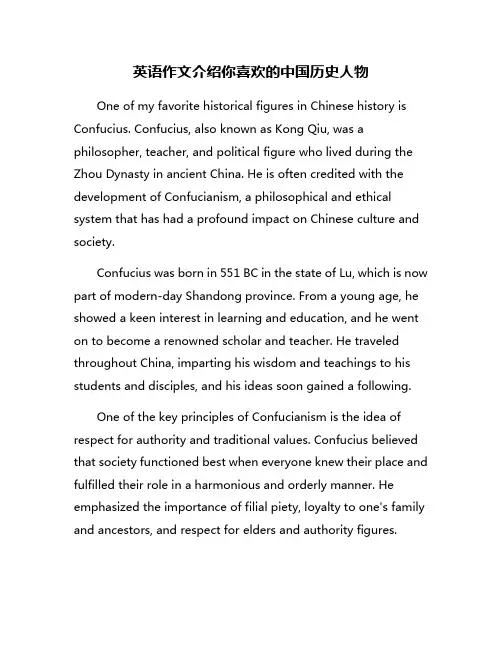
英语作文介绍你喜欢的中国历史人物One of my favorite historical figures in Chinese history is Confucius. Confucius, also known as Kong Qiu, was a philosopher, teacher, and political figure who lived during the Zhou Dynasty in ancient China. He is often credited with the development of Confucianism, a philosophical and ethical system that has had a profound impact on Chinese culture and society.Confucius was born in 551 BC in the state of Lu, which is now part of modern-day Shandong province. From a young age, he showed a keen interest in learning and education, and he went on to become a renowned scholar and teacher. He traveled throughout China, imparting his wisdom and teachings to his students and disciples, and his ideas soon gained a following.One of the key principles of Confucianism is the idea of respect for authority and traditional values. Confucius believed that society functioned best when everyone knew their place and fulfilled their role in a harmonious and orderly manner. He emphasized the importance of filial piety, loyalty to one's family and ancestors, and respect for elders and authority figures.Confucius also placed a strong emphasis on education and self-improvement. He believed that through learning and study, individuals could cultivate their virtues and become better members of society. He stressed the importance of moral integrity, honesty, and ethical behavior, and he encouraged his followers to strive for personal excellence in all aspects of their lives.Despite facing opposition and persecution during his lifetime, Confucius remained steadfast in his beliefs and continued to teach and inspire others until his death in 479 BC. His teachings were later compiled into a collection of writings known as the "Analects," which have been studied and revered by generations of scholars and students throughout China and beyond.In conclusion, Confucius is a remarkable figure in Chinese history who has left a lasting legacy that continues to influence Chinese culture and society to this day. His teachings on ethics, morality, and the importance of education and self-improvement have resonated with countless individuals over the centuries, making him a timeless and enduring symbol of wisdom and virtue. As someone who appreciates the value of tradition,wisdom, and ethical living, I find great inspiration in the life and teachings of Confucius.。
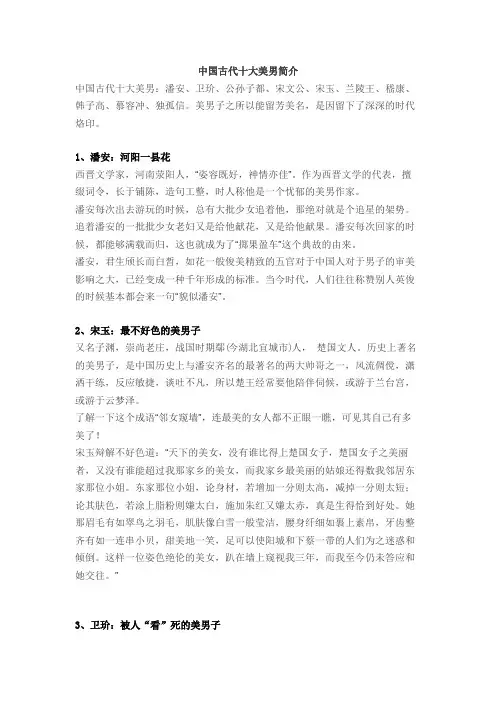
中国古代十大美男简介中国古代十大美男:潘安、卫玠、公孙子都、宋文公、宋玉、兰陵王、嵇康、韩子高、慕容冲、独孤信。
美男子之所以能留芳美名,是因留下了深深的时代烙印。
1、潘安:河阳一县花西晋文学家,河南荥阳人,“姿容既好,神情亦佳”。
作为西晋文学的代表,擅缀词令,长于铺陈,造句工整,时人称他是一个忧郁的美男作家。
潘安每次出去游玩的时候,总有大批少女追着他,那绝对就是个追星的架势。
追着潘安的一批批少女老妇又是给他献花,又是给他献果。
潘安每次回家的时候,都能够满载而归,这也就成为了“掷果盈车”这个典故的由来。
潘安,君生颀长而白晳,如花一般俊美精致的五官对于中国人对于男子的审美影响之大,已经变成一种千年形成的标准。
当今时代,人们往往称赞别人英俊的时候基本都会来一句“貌似潘安”。
2、宋玉:最不好色的美男子又名子渊,崇尚老庄,战国时期鄢(今湖北宜城市)人,楚国文人。
历史上著名的美男子,是中国历史上与潘安齐名的最著名的两大帅哥之一,风流倜傥,潇洒干练,反应敏捷,谈吐不凡,所以楚王经常要他陪伴伺候,或游于兰台宫,或游于云梦泽。
了解一下这个成语“邻女窥墙”,连最美的女人都不正眼一瞧,可见其自己有多美了!宋玉辩解不好色道:“天下的美女,没有谁比得上楚国女子,楚国女子之美丽者,又没有谁能超过我那家乡的美女,而我家乡最美丽的姑娘还得数我邻居东家那位小姐。
东家那位小姐,论身材,若增加一分则太高,减掉一分则太短;论其肤色,若涂上脂粉则嫌太白,施加朱红又嫌太赤,真是生得恰到好处。
她那眉毛有如翠鸟之羽毛,肌肤像白雪一般莹洁,腰身纤细如裹上素帛,牙齿整齐有如一连串小贝,甜美地一笑,足可以使阳城和下蔡一带的人们为之迷惑和倾倒。
这样一位姿色绝伦的美女,趴在墙上窥视我三年,而我至今仍未答应和她交往。
”3、卫玠:被人“看”死的美男子卫玠(285-312年),字叔宝,山西夏县人。
他是魏晋之际著名的清谈名士和玄理学家。
魏晋南北朝是中国历史上极度混乱的一个时期,但同时却是个美男如玉的年代。
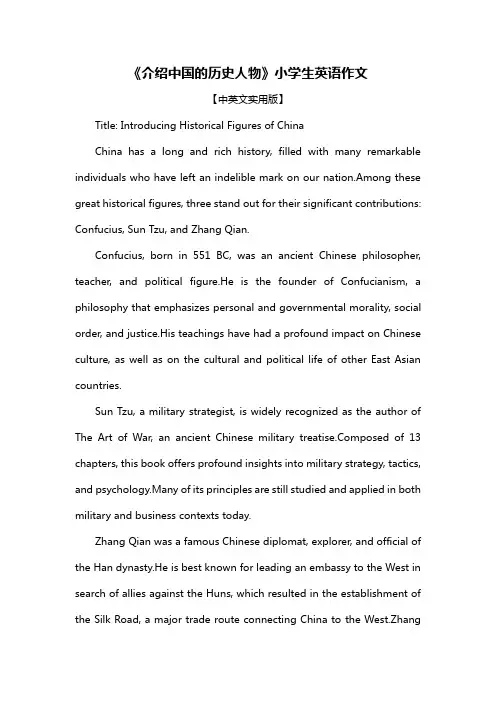
《介绍中国的历史人物》小学生英语作文【中英文实用版】Title: Introducing Historical Figures of ChinaChina has a long and rich history, filled with many remarkable individuals who have left an indelible mark on our nation.Among these great historical figures, three stand out for their significant contributions: Confucius, Sun Tzu, and Zhang Qian.Confucius, born in 551 BC, was an ancient Chinese philosopher, teacher, and political figure.He is the founder of Confucianism, a philosophy that emphasizes personal and governmental morality, social order, and justice.His teachings have had a profound impact on Chinese culture, as well as on the cultural and political life of other East Asian countries.Sun Tzu, a military strategist, is widely recognized as the author of The Art of War, an ancient Chinese military posed of 13 chapters, this book offers profound insights into military strategy, tactics, and psychology.Many of its principles are still studied and applied in both military and business contexts today.Zhang Qian was a famous Chinese diplomat, explorer, and official of the Han dynasty.He is best known for leading an embassy to the West in search of allies against the Huns, which resulted in the establishment of the Silk Road, a major trade route connecting China to the West.ZhangQian's journey is recorded in the historical text 'Records of the Grand Historian' by Sima Qian, and his experiences have inspired generations of Chinese to value courage, perseverance, and the pursuit of knowledge.These three historical figures represent key aspects of Chinese culture and history: Confucius personifies the pursuit of moral and ethical excellence; Sun Tzu symbolizes strategic thinking and wisdom in conflict; and Zhang Qian embodies the spirit of exploration and the value of opening up to the world.Their ideas and actions have shaped China's past and continue to influence its present and future.。
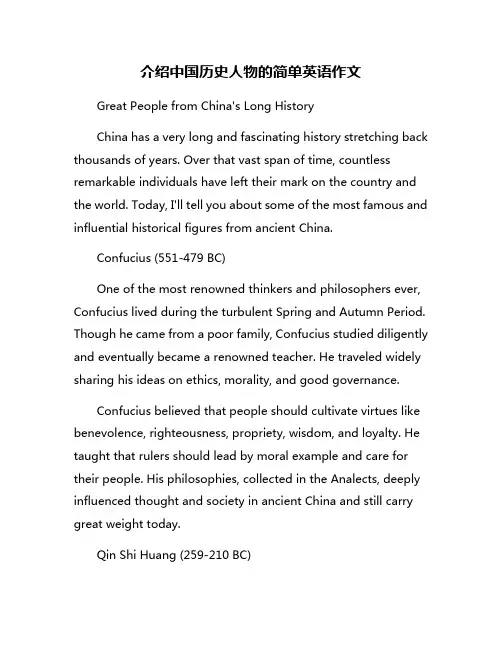
介绍中国历史人物的简单英语作文Great People from China's Long HistoryChina has a very long and fascinating history stretching back thousands of years. Over that vast span of time, countless remarkable individuals have left their mark on the country and the world. Today, I'll tell you about some of the most famous and influential historical figures from ancient China.Confucius (551-479 BC)One of the most renowned thinkers and philosophers ever, Confucius lived during the turbulent Spring and Autumn Period. Though he came from a poor family, Confucius studied diligently and eventually became a renowned teacher. He traveled widely sharing his ideas on ethics, morality, and good governance.Confucius believed that people should cultivate virtues like benevolence, righteousness, propriety, wisdom, and loyalty. He taught that rulers should lead by moral example and care for their people. His philosophies, collected in the Analects, deeply influenced thought and society in ancient China and still carry great weight today.Qin Shi Huang (259-210 BC)While Confucius promoted moral philosophy, Qin Shi Huang was all about raw power. He started out as the King of Qin, one of the Warring States that constantly battled each other. Through a brilliant mix of strategy and force, the young king conquered his rivals one by one.In 221 BC, Qin Shi Huang became the first emperor of a unified China under the new Qin Dynasty. To solidify his control, he undertook massive infrastructure projects like the Great Wall and a systematic network of roads and canals. His reign ushered in a golden age of standardized laws, language, currency, and more that brought stability after centuries of chaos.Lady MulanYou may know the legendary folk heroine Mulan from the famous Disney movie. As the tale goes, a young woman living in Northern China disguised herself as a male soldier to take her aged father's place in the emperor's army. Mulan trained hard, battled invading forces, and served twelve years with outstanding courage and patriotism.Her inspiring deeds came to light after the war ended. Rather than punishing her for defying gender roles, the emperor honored Mulan for helping save China. She personifies values like filial piety, selflessness, and strength that Chinese culturecelebrates. Whether fully fact or fiction, her story has motivated generations.Zhang Qian (195-114 BC)You could call Zhang Qian one of the world's first great explorers. In 139 BC, the Han emperor sent him on a mission to explore the regions to China's west and open trade routes through Central Asia. Over an epic 13-year journey across deserts and mountains, Zhang was captured, escaped, and braved myriad dangers before finally reaching lands like Fergana (modern Uzbekistan).Zhang's travels opened up connections between ancient China and civilizations across Eurasia, enabling a vibrant exchange of goods, technologies, and ideas along what became known as the Silk Road trade routes. His courage and persistence helped spark an era of openness and cross-cultural contact.Empress Wu Zetian (624-705 AD)For over 2,000 years of imperial rule, not a single woman officially took the dragon throne – until Wu Zetian. Born in 624 AD during the Tang Dynasty, Wu started out as a low-ranked concubine but swiftly rose to power through her intelligence and Political savvy.Eventually seizing control, Wu became China's only legitimate female emperor in 690 AD and founded her own Zhou Dynasty that lasted 15 years. A highly capable and ruthless ruler, she consolidated authority, smashed rebellions, and initiated economic and agricultural reforms. Wu shattered ancient taboos about gender roles through her determination and strength of character.Those are just a few of the countless fascinating historical figures who made their mark on China over the millennia. From pioneering thinkers to mighty emperors and unlikely heroes, their stories continue to inspire us today with tales of wisdom, leadership, courage, and transformation. I hope you enjoyed learning a bit about these legends and maybe will read more about China's amazingly rich history!。
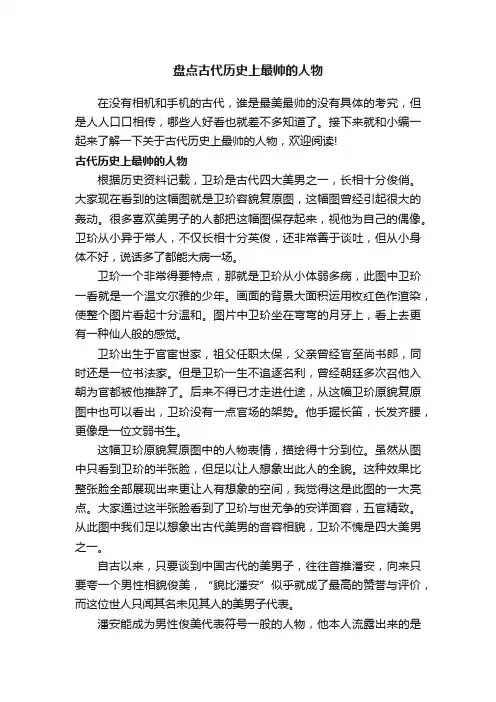
盘点古代历史上最帅的人物在没有相机和手机的古代,谁是最美最帅的没有具体的考究,但是人人口口相传,哪些人好看也就差不多知道了。
接下来就和小编一起来了解一下关于古代历史上最帅的人物,欢迎阅读!古代历史上最帅的人物根据历史资料记载,卫玠是古代四大美男之一,长相十分俊俏。
大家现在看到的这幅图就是卫玠容貌复原图,这幅图曾经引起很大的轰动。
很多喜欢美男子的人都把这幅图保存起来,视他为自己的偶像。
卫玠从小异于常人,不仅长相十分英俊,还非常善于谈吐,但从小身体不好,说话多了都能大病一场。
卫玠一个非常得要特点,那就是卫玠从小体弱多病,此图中卫玠一看就是一个温文尔雅的少年。
画面的背景大面积运用枚红色作渲染,使整个图片看起十分温和。
图片中卫玠坐在弯弯的月牙上,看上去更有一种仙人般的感觉。
卫玠出生于官宦世家,祖父任职太保,父亲曾经官至尚书郎,同时还是一位书法家。
但是卫玠一生不追逐名利,曾经朝廷多次召他入朝为官都被他推辞了。
后来不得已才走进仕途,从这幅卫玠原貌复原图中也可以看出,卫玠没有一点官场的架势。
他手握长笛,长发齐腰,更像是一位文弱书生。
这幅卫玠原貌复原图中的人物表情,描绘得十分到位。
虽然从图中只看到卫玠的半张脸,但足以让人想象出此人的全貌。
这种效果比整张脸全部展现出来更让人有想象的空间,我觉得这是此图的一大亮点。
大家通过这半张脸看到了卫玠与世无争的安详面容,五官精致。
从此图中我们足以想象出古代美男的音容相貌,卫玠不愧是四大美男之一。
自古以来,只要谈到中国古代的美男子,往往首推潘安,向来只要夸一个男性相貌俊美,“貌比潘安”似乎就成了最高的赞誉与评价,而这位世人只闻其名未见其人的美男子代表。
潘安能成为男性俊美代表符号一般的人物,他本人流露出来的是一种眉清目秀的清丽,柔和忧愁的文人才子气息。
潘安被记载在世说新语的容止篇中,讲述了他身形、相貌姣好,神情十分动人。
他青少年时期,拿着弹弓外出洛阳道上打猎,凡是少女、少妇见了他,每个人都争先将手连起来把他围在其中。
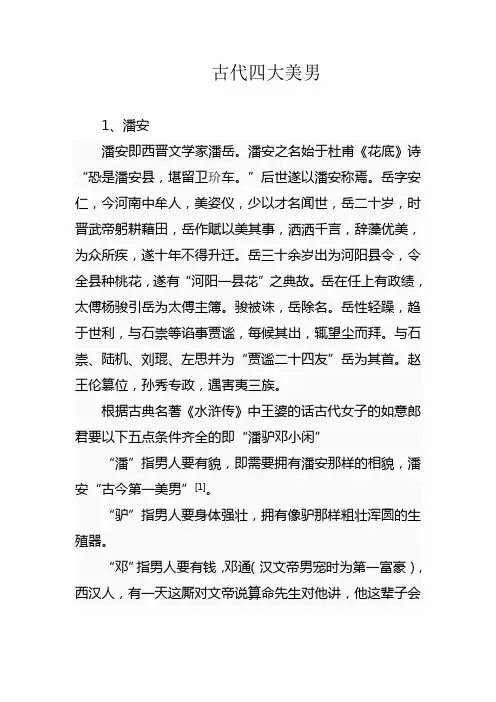
古代四大美男1、潘安潘安即西晋文学家潘岳。
潘安之名始于杜甫《花底》诗“恐是潘安县,堪留卫玠车。
”后世遂以潘安称焉。
岳字安仁,今河南中牟人,美姿仪,少以才名闻世,岳二十岁,时晋武帝躬耕藉田,岳作赋以美其事,洒洒千言,辞藻优美,为众所疾,遂十年不得升迁。
岳三十余岁出为河阳县令,令全县种桃花,遂有“河阳一县花”之典故。
岳在任上有政绩,太傅杨骏引岳为太傅主簿。
骏被诛,岳除名。
岳性轻躁,趋于世利,与石崇等谄事贾谧,每候其出,辄望尘而拜。
与石崇、陆机、刘琨、左思并为“贾谧二十四友”岳为其首。
赵王伦篡位,孙秀专政,遇害夷三族。
根据古典名著《水浒传》中王婆的话古代女子的如意郎君要以下五点条件齐全的即“潘驴邓小闲”“潘”指男人要有貌,即需要拥有潘安那样的相貌,潘安“古今第一美男”[1]。
“驴”指男人要身体强壮,拥有像驴那样粗壮浑圆的生殖器。
“邓”指男人要有钱,邓通(汉文帝男宠时为第一富豪),西汉人,有一天这厮对文帝说算命先生对他讲,他这辈子会穷死,文帝就让他“铸天下钱”,即西汉时期的中国人民银行行长,于是他成了比陶朱公还有财的人。
“小”指男人性情要乖巧善解人意,就是说要像贾宝玉一样讨女人欢心,至少脾气要好,抗击打能力要强,能够在家庭暴力中扮演受虐者角色。
“闲”就是任何时间女人要求什么男人都无条件的服从,随叫随到、无怨无悔。
潘岳出身儒学世家少年随父仕宦游历山东、河南、河北,青年时期就读洛阳太学,二十余岁入仕供职权臣贾充幕府后历任京官,因拍皇帝马屁显露才华被当权者左迁河阳县令(今洛阳吉利区)、潘岳负其才而郁郁不得志。
时尚书仆射山涛、领吏部王济、裴楷等受宠,潘岳很憎恨他们,于是在宫殿大门柱子上写下歌谣:“阁道东,有大牛。
王济鞅,裴楷鞧,和峤刺促不得休。
”又被左迁离洛阳更远的怀县做县令潘岳做得有声有色、政绩斐然,朝廷提拔他到京城做财政部官员后来因为犯事被免职不久被太傅杨骏引入门下做了太傅主簿,后来太傅杨骏获罪被诛灭十族,潘安作为幕僚也在被诛之列,幸亏当时他公事在外又有当权者楚王的心腹他的好友公孙弘替他说话(潘岳曾在他贫困潦倒时帮助过他)他被调往长安做县令,因为母亲生病辞官奉养,在此期间与好友石崇附会贾充外孙贾谧,之后升迁做了黄门侍郎,贾谧开阁延宾,召集天下文士天下潘安、石崇、陆机、左思、刘琨等二十四人因文采盖世被称为“鲁王二十四友”他们经常活跃在巨富石崇的金谷园里因此也被称为“金谷二十四友”。
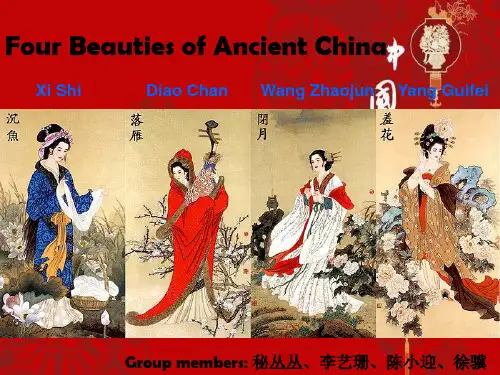
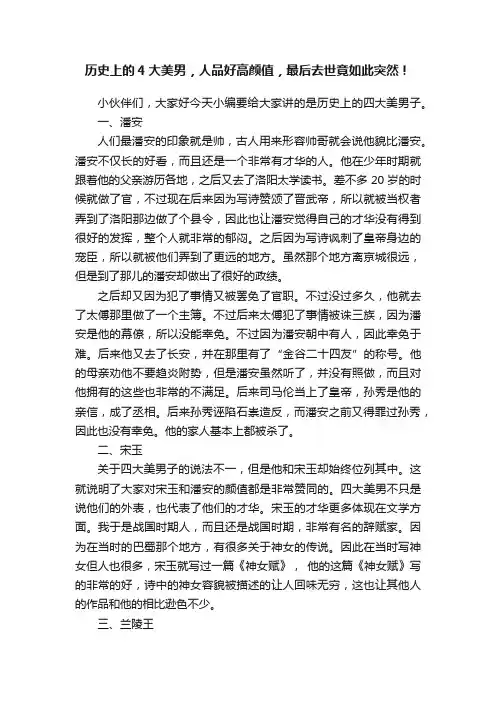
历史上的4大美男,人品好高颜值,最后去世竟如此突然!小伙伴们,大家好今天小编要给大家讲的是历史上的四大美男子。
一、潘安人们最潘安的印象就是帅,古人用来形容帅哥就会说他貌比潘安。
潘安不仅长的好看,而且还是一个非常有才华的人。
他在少年时期就跟着他的父亲游历各地,之后又去了洛阳太学读书。
差不多20岁的时候就做了官,不过现在后来因为写诗赞颂了晋武帝,所以就被当权者弄到了洛阳那边做了个县令,因此也让潘安觉得自己的才华没有得到很好的发挥,整个人就非常的郁闷。
之后因为写诗讽刺了皇帝身边的宠臣,所以就被他们弄到了更远的地方。
虽然那个地方离京城很远,但是到了那儿的潘安却做出了很好的政绩。
之后却又因为犯了事情又被罢免了官职。
不过没过多久,他就去了太傅那里做了一个主簿。
不过后来太傅犯了事情被诛三族,因为潘安是他的幕僚,所以没能幸免。
不过因为潘安朝中有人,因此幸免于难。
后来他又去了长安,并在那里有了“金谷二十四友”的称号。
他的母亲劝他不要趋炎附势,但是潘安虽然听了,并没有照做,而且对他拥有的这些也非常的不满足。
后来司马伦当上了皇帝,孙秀是他的亲信,成了丞相。
后来孙秀诬陷石崇造反,而潘安之前又得罪过孙秀,因此也没有幸免。
他的家人基本上都被杀了。
二、宋玉关于四大美男子的说法不一,但是他和宋玉却始终位列其中。
这就说明了大家对宋玉和潘安的颜值都是非常赞同的。
四大美男不只是说他们的外表,也代表了他们的才华。
宋玉的才华更多体现在文学方面。
我于是战国时期人,而且还是战国时期,非常有名的辞赋家。
因为在当时的巴蜀那个地方,有很多关于神女的传说。
因此在当时写神女但人也很多,宋玉就写过一篇《神女赋》,他的这篇《神女赋》写的非常的好,诗中的神女容貌被描述的让人回味无穷,这也让其他人的作品和他的相比逊色不少。
三、兰陵王兰陵王叫做高长恭,小编第一次知道他是因为当时一部很火的电视剧《兰陵王妃》。
在电视剧中兰陵王的设定就是一位美男子,而真正的高长恭也确实是一位美男子。
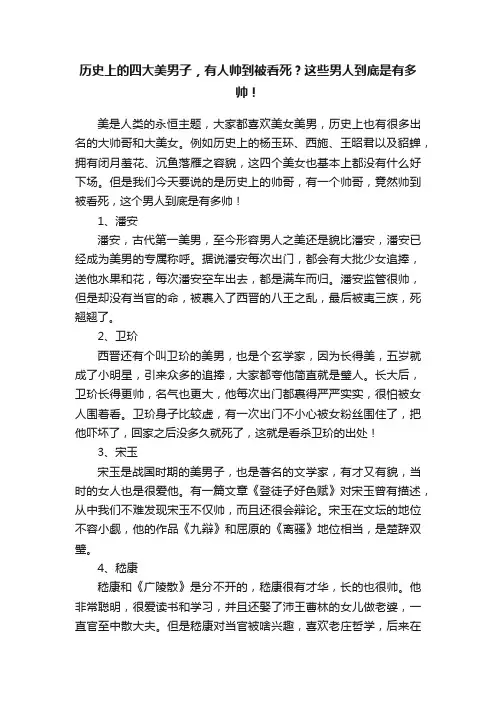
历史上的四大美男子,有人帅到被看死?这些男人到底是有多帅!美是人类的永恒主题,大家都喜欢美女美男,历史上也有很多出名的大帅哥和大美女。
例如历史上的杨玉环、西施、王昭君以及貂蝉,拥有闭月羞花、沉鱼落雁之容貌,这四个美女也基本上都没有什么好下场。
但是我们今天要说的是历史上的帅哥,有一个帅哥,竟然帅到被看死,这个男人到底是有多帅!1、潘安潘安,古代第一美男,至今形容男人之美还是貌比潘安,潘安已经成为美男的专属称呼。
据说潘安每次出门,都会有大批少女追捧,送他水果和花,每次潘安空车出去,都是满车而归。
潘安监管很帅,但是却没有当官的命,被裹入了西晋的八王之乱,最后被夷三族,死翘翘了。
2、卫玠西晋还有个叫卫玠的美男,也是个玄学家,因为长得美,五岁就成了小明星,引来众多的追捧,大家都夸他简直就是璧人。
长大后,卫玠长得更帅,名气也更大,他每次出门都裹得严严实实,很怕被女人围着看。
卫玠身子比较虚,有一次出门不小心被女粉丝围住了,把他吓坏了,回家之后没多久就死了,这就是看杀卫玠的出处!3、宋玉宋玉是战国时期的美男子,也是著名的文学家,有才又有貌,当时的女人也是很爱他。
有一篇文章《登徒子好色赋》对宋玉曾有描述,从中我们不难发现宋玉不仅帅,而且还很会辩论。
宋玉在文坛的地位不容小觑,他的作品《九辩》和屈原的《离骚》地位相当,是楚辞双璧。
4、嵇康嵇康和《广陵散》是分不开的,嵇康很有才华,长的也很帅。
他非常聪明,很爱读书和学习,并且还娶了沛王曹林的女儿做老婆,一直官至中散大夫。
但是嵇康对当官被啥兴趣,喜欢老庄哲学,后来在宫廷政变中被判死刑,临终时三千弟子为他求情也没啥用,后来在刑场上他弹了《广陵散》,之后《广陵散》失传!看完美男美女,小编不由感叹,长得太美,也不是啥好事啊,你说呢?。

历史上的⼗⼤美男 历史上最帅的⼈物有哪些⼈?历史美男⼦是谁?下⾯⼩编整理的历史上最帅的⼗⼤美男排名榜,⼀起来看看吧。
历史上的⼗⼤美男历史美男⼦历史上最帅男⼈排名榜 第⼗名:邹忌邹忌是齐国有名的帅哥。
⾝型修长(⾝⾼⼋尺有余),⽽且形态“昳丽”。
他的帅不仅是外在的帅,同时他⼜是⼀个很有思想的⼈。
第九名:宋⽟宋⽟是中国历史上与潘安齐名的最著名的两⼤帅哥之⼀,据说,宋⽟是屈原弟⼦,他并没有因为其美貌⽽青云直上,其在官场上混得还是⽐较差的,⼀⽣都没有做过什么⼤官。
第⼋名:宋⽂公宋⽂公没有做国君的时候,是宋国的公⼦,被唤做公⼦鲍。
如果按照正常情况发展的话,本来是轮不到他做国君的,那么⼜是什么原因使得历史照着⾮正常的状况发展了下去⽽让原先的公⼦鲍坐上了宋国国君的宝座的呢?原因就是因为他长的实在太帅了! 第七名:韩⼦⾼梁朝会稽⼭阴⼈,⾝世微贱,以做鞋为⽣。
据说他“容貌艳丽,纤妍洁⽩,如美妇⼈。
螓⾸膏发,⾃然娥眉,见者靡不啧啧”。
韩⼦⾼他貌美,美过中国少年瑰宝周⼩史(晋代有名的娈童)。
第六名:吕布吕布字奉先,三国五原郡九原⼈,官⾄温侯,⾝材⾼⼤(估计有190m以上),相貌英俊,武艺⾼强。
吕布不但⾐着华丽,⽽且喜欢耍酷,他⼀出场就是“器宇轩昂,威风凛凛,⼿执⽅天画戟,怒⽬⽽视”,简直是酷毙了。
第五名:嵇康“⽵林七贤”的领袖⼈物。
三国时魏末著名的思想家,诗⼈与⾳乐家,是当时⽞学家的代表⼈物之⼀,为⼈耿直,他幼年丧⽗,励志勤学。
嵇康是中国古代少有的美男作家,精通⽂学,⽞学和⾳乐,同时英俊潇洒,别⼈形容他是“龙章凤姿,天质⾃然”。
第四名:⼦都“⼦都”被⽤作了帅哥的代名词,或者也可以说,⼦都乃是众多郑国少⼥——不排除某些少男——梦中的⽩马王⼦和假想的约会对象,少⼥们都以能见到那位帅名满全国的⼦都为荣,为了能见他⼀眼,甚⾄不惜呆呆的苦等上好⼏个⼩时。
第三名:兰陵王兰陵王名⾼长恭,⼜名⾼孝瓘,是东魏⼤权⾂北齐奠基⼈⽩⼿起家⼤英雄风流⼤丞相⾼欢之孙。
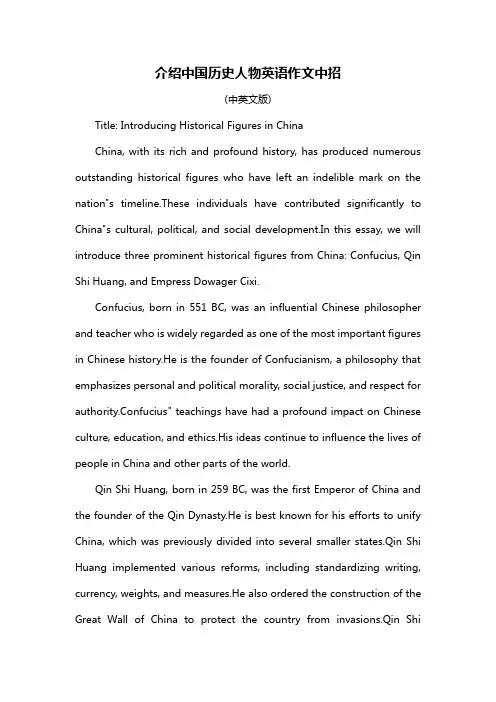
介绍中国历史人物英语作文中招(中英文版)Title: Introducing Historical Figures in ChinaChina, with its rich and profound history, has produced numerous outstanding historical figures who have left an indelible mark on the nation"s timeline.These individuals have contributed significantly to China"s cultural, political, and social development.In this essay, we will introduce three prominent historical figures from China: Confucius, Qin Shi Huang, and Empress Dowager Cixi.Confucius, born in 551 BC, was an influential Chinese philosopher and teacher who is widely regarded as one of the most important figures in Chinese history.He is the founder of Confucianism, a philosophy that emphasizes personal and political morality, social justice, and respect for authority.Confucius" teachings have had a profound impact on Chinese culture, education, and ethics.His ideas continue to influence the lives of people in China and other parts of the world.Qin Shi Huang, born in 259 BC, was the first Emperor of China and the founder of the Qin Dynasty.He is best known for his efforts to unify China, which was previously divided into several smaller states.Qin Shi Huang implemented various reforms, including standardizing writing, currency, weights, and measures.He also ordered the construction of the Great Wall of China to protect the country from invasions.Qin ShiHuang"s contributions to China"s unification and infrastructure development have made him an iconic figure in Chinese history.Empress Dowager Cixi, born in 1835, was a prominent Chinese politician who ruled China as the regent for her son and nephew from 1861 to 1908.She was a member of the Manchu ethnic group and came from a wealthy and powerful family.During her reign, Empress Dowager Cixi implemented various reforms aimed at modernizing China and strengthening its economy and military.She also supported the Self-Strengthening Movement, which aimed to adopt Western technologies and ideas to improve China"s strength.Despite her efforts, Empress Dowager Cixi was unable to prevent the downfall of the Qing Dynasty.In conclusion, Confucius, Qin Shi Huang, and Empress Dowager Cixi are three of the most influential historical figures in China.Confucius" philosophy continues to shape Chinese culture and ethics, while Qin Shi Huang"s efforts to unify China and construct the Great Wall have left a lasting legacy.Empress Dowager Cixi"s reign marked a period of modernization and reform in China, although ultimately unable to prevent the collapse of the Qing Dynasty.These historical figures have played a crucial role in shaping China"s history and continue to be revered today.。
古代历史上最帅的人是哪一位在古代没有相机,古代的人长什么样我们也不清楚,但好看的人是大家都会喜欢的,大家口口相传也就知道了。
接下来就和小编一起来了解一下关于古代历史上最帅的人物,欢迎阅读!古代历史上最帅的人物一、潘安潘岳,就是人所周知的潘安,西晋时人,表字安仁,小字檀奴。
其人“姿容既好,神情亦佳”。
潘岳年轻时,坐车到洛阳城外游玩,当时不少妙龄姑娘见了他,都会怦然心动给他一个“回头率”,有的甚至忘情地跟着他走。
因此常吓得潘安不敢出门。
有的怀春少女难以亲近他,就用水果来投掷他,每每满载而归,于是民间就有了“掷果盈车”之说。
以至后世文学中“檀奴”或“檀郎”也成了俊美情郎的代名词。
有个叫张孟阳的相貌奇丑,也学着潘岳的样子去郊游,但每次出门,妇人就往他车上吐唾沫,扔石头,石头倒也满载而归。
典型的男性版东施效颦!二、卫玠卫玠是历史上唯一因为太帅了而被人“看”死的美男子记得三国中杀掉邓艾父子的卫瓘吗?卫玠就是他的孙子,表字叔宝。
关于卫玠的美,《晋书》里用词有“明珠”,“玉润”等等,他为人喜怒不表于形,总之是个面无表情的玉人。
这孩子自幼风神秀异,坐着羊车行在洛阳街上,远远望去,就恰似白玉雕的塑像,时人称之“璧人”。
洛阳居民倾城而出,夹道观看小璧人。
可这玉人特爱开口。
当时风气最盛行清谈:手里拿个麈尾模样悠雅地侃侃而谈。
刚开始时,“清谈”主要谈老庄之道,还有点哲学氛围,后来变成了天南海北乱侃,比如谈论人家的长相和行为。
爹妈怕卫玠磨牙磨得太累影响身体健康,而且政治问题太敏感,最好避开,就限制他说话,真叫人吃不消三、兰陵王兰陵王名高长恭,又名高孝瓘,是东魏大权臣北齐奠基人白手起家大英雄风流大丞相高欢之孙。
高欢长子高澄在父亲死后当上东魏第二任权臣。
高澄政治上精明强干,却于29岁死在奴隶手里,丢下六个嗷嗷待乳的儿子,老四就是成为千古传说的兰陵王。
值得一提的是,正史里忠实记录了另外五兄弟的母亲出处,就长恭例外:“兰陵王长恭不得母氏姓”。
介绍一位最喜欢的中国历史人物的英语作文Introduction:I would like to introduce one of my favorite Chinese historical figures, Emperor Wu of Han. He was the seventh emperor of the Han dynasty, ruling from 141 BC to 87 BC. Emperor Wu is known for his ambitious reforms, military conquests, and cultural achievements. His reign is considered as one of the most prosperous and influential periods in Chinese history.Early Life:Emperor Wu, also known as Liu Che, was born in 156 BC in Chang'an, the capital of the Han dynasty. He was the ninth son of Emperor Jing and Empress Wang Zhi. Despite being born into the royal family, Emperor Wu was not initially considered a potential heir to the throne. However, after his older brother Fuling died, Emperor Wu was chosen as the crown prince.Reforms and Achievements:Emperor Wu implemented a series of reforms during his reign that aimed to strengthen the central government, improve the economy, and expand the territory of the Han dynasty. He adopted legalist policies and promoted the recruitment oftalented officials based on merit rather than noble birth. Emperor Wu also introduced new technologies, such as water-powered mills and the iron plow, to increase agricultural productivity.Military Campaigns:Emperor Wu was a successful military strategist and led several campaigns to expand the Han empire. He conquered various regions in the north and west, including the Xiongnu confederation and the Baiyue tribes in the south. Emperor Wu also sent explorers to establish trade routes with Central Asia and India, known as the Silk Road. These military achievements helped to enhance the prestige and power of the Han dynasty.Cultural Patronage:Emperor Wu was a great patron of the arts and culture, promoting Confucianism as the official state ideology. He established academies and libraries to educate scholars and preserve ancient texts. Emperor Wu also built magnificent palaces, temples, and tombs, including the famous Mausoleum of Western Han, where he was buried with his empress Wang Zhi.Legacy:Emperor Wu of Han is remembered as a visionary leader who transformed the Han dynasty into a powerful and prosperous empire. His reforms and achievements laid the foundation for future generations of Chinese rulers and scholars. Emperor Wu's legacy continues to inspire admiration and study in contemporary China and around the world.Conclusion:In conclusion, Emperor Wu of Han was a remarkable historical figure whose reign shaped the course of Chinese history. His ambitious reforms, military conquests, and cultural achievements have left a lasting impact on the development of Chinese civilization. Emperor Wu's legacy serves as a testament to his leadership, wisdom, and dedication to the progress of his empire. I admire Emperor Wu for his contributions to Chinese history and the enduring legacy he has left for future generations to appreciate and learn from.。
要说历史上的美男,可忘不了这四个人:潘安宋玉、卫玠高长恭。
这四个人可谓是以绝世容颜而闻名。
中国古代,男人讲求的是身强力壮,五大三粗,而这些美貌的男子在当时可以说是稀世少见。
说到潘安,大家可能都不陌生,他应该是中国历史上因为美貌而最出名的一个了,甚至还为他造了一个成语“貌比潘安”。
他应该是“中国古代四大美男”最帅的一个了。
潘安不仅脸长得好,头脑也好使,他还是个文学家,在当时也以文著称。
潘安是个官三代,脸长得好身世也好头脑也好,所以他特别受女生追捧。
他每次乘车出门都有爱慕他的女生往他车里仍水果,由此还演变一个成语“掷果盈车”,来表示女子对男子的爱慕。
别看潘安风流倜傥,可他还是一个对爱情十分专一的人,他的爱情观念就是“一生一世一双人”,这在当时是十分少有的。
因此,他与他青梅竹马的妻子相亲相爱生活了大半辈子,直到他妻子去世也没有拈花惹草。
就是这样一个优秀的男人,他的下场却让人唏嘘,因为站错政治立场,最后被满门抄斩,真是让人悲叹不已。
魏晋南北朝是一个出帅哥美女的时代,四大美男有三个是这个时期的,不得不说,在这样一个民族大融合,各方人士逍遥自在的时代,也让人们格外的注意自己的外在形象。
而卫玠就是西晋的著名的帅哥,他跟潘安似的,不只有一个好皮囊,文学、玄学等许多学问他都精通,所以他在当时的名气还挺大的。
他刚搬去京城的时候,他的粉丝将街道都堵满了,很多都是远道而来的粉丝。
因为卫玠从小体弱多病,到京城后又受了很多人气儿,结果当时就发病了,没过多久就不治身亡。
这就是历史上著名的“看杀卫玠”,这种独特的死法,在历史上也就他一人了。
这种结局,跟他名字其实也有点关系。
玠是珪的意思,珪就是玉珪,是古时候用于祭祀的一种玉器,美好无暇却不能沾染一点人气和污浊之气。
一旦碰到不好的东西就会遭到损坏。
而卫玠就是一块美玉,遭受人气的污浊之后,他又怎能承受得了呢?卫玠的英年早逝带给人们的只有深深的长叹。
他死后,有很多名人志士给他送行,当时谢鲲听说他去世的消息,悲痛不已,嚎叫到:“栋梁折矣,岂不哀欤。
介绍中国古代人物的英语作文范文模板In ancient China, there existed a myriad of extraordinary individuals whose legacies continue to inspire generations. Among these revered figures, one stands out prominently - Confucius. Born in the state of Lu during the Zhou dynasty, Confucius, also known as Kong Qiu, left an indelible markon Chinese philosophy and culture.Confucius was a sage, teacher, and political figure whose teachings emphasized the importance of ethical conduct, familial piety, and social harmony. His philosophy revolved around the cultivation of moral virtues such as benevolence, righteousness, propriety, wisdom, and faithfulness. Through his timeless aphorisms and teachings, Confucius sought to establish a moral framework that would guide individuals towards self-improvement and harmonious coexistence with others.One of Confucius's most famous works is the "Analects," a collection of his sayings and dialogues compiled by his disciples. These profound teachings cover a wide range oftopics, including governance, education, morality, and interpersonal relationships. Central to Confucius's philosophy is the concept of "ren," often translated as benevolence or humaneness, which underscores the importance of empathy, compassion, and ethical responsibility towards others.Moreover, Confucius's emphasis on the role of the ruler as a virtuous exemplar and the importance of ritual propriety in governance has had a lasting impact on Chinese political thought. His teachings continue to influence not only Chinese society but also global discussions on ethics, leadership, and the pursuit of a harmonious society.In conclusion, Confucius remains a revered figure in Chinese history, revered for his profound wisdom, ethical teachings, and enduring legacy. His emphasis on moral cultivation, social harmony, and the importance of virtuous leadership continues to resonate with people around the world, making him a timeless symbol of wisdom and virtue.。